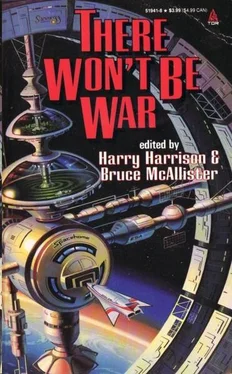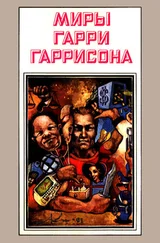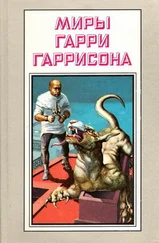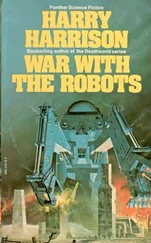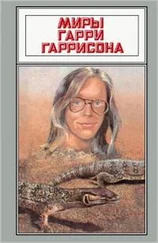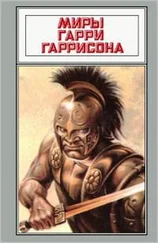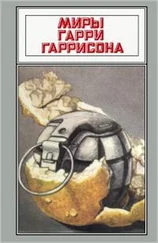“Of course, of course,” Vargas said. John Odoacer Gatt was getting him a little nervous. He didn’t know what this was leading up to. “But how could this be possible? ”
“Let’s talk more about it after the vote tomorrow,” Gatt said.
* * *
The delegates’ voting room was a large and circular chamber equipped with comfortable chairs and a cluster of overhead lighting. In the center was a circular stage that revolved slowly so that those in the center would by turns be facing all the delegates. On the platform was the steering committee for the first provisional and temporary world military government.
The generals, Vargas included, voted in a brisk and unanimous manner to disenfranchise all civilians outside of those few approved ones already assembled at the delegate hall. The civilians were stripped of the vote, habeas corpus, the Bill of Rights, the Constitution, and all other liberal encumbrances until such time as they could be relied upon to vote in a prescribed manner. This was a very important measure because the military had found out long ago that civilians were inherently untrustworthy and even traitorous.
Next the generals faced the serious question of disarmament, or, as they called it, unemployment. Disarmament meant there would be hard times ahead because war on Earth was finished as a business since everybody was now under a unified command and there was no one to fight. None of the generals liked the idea of giving up war entirely, however, and General Gatt said there might be a way around that and promised there would be an announcement about that later.
The conference ended with a good cheer and boisterous camaraderie among the various military satraps. Vargas very much enjoyed the reception afterwards, where Lupe made a big hit in her blue, yellow and red ball gown.
After the reception, General Gatt took Vargas aside and asked to meet him tomorrow morning at eight hundred hours sharp at the Ground Zero Motor Pool.
“I have a proposition to put to you,” Gatt said. “I think you will find it of interest.”
Vargas, accompanied by Lupe, was at the Ground Zero Motor Pool at the appointed hour. That morning he was wearing his sash of Commander in the Legion of Death, and also his campaign medals from the sacking of New York. He’d come a long way from when he was a mere bandit’s apprentice.
Soon they were speeding out of the city into the flat desert countryside. It was a time of blooming, and there were many little wild flowers carpeting the desert floor with delicate colors.
“This is really nice,” Vargas said.
“It used to belong to some Indian tribe,” the driver said. “I can never remember which one. They’re all gone now to Indianola.”
“What’s that?”
“Indianola is the new industrial suburb in Mississippi where we’re relocating all the Indians in America.”
“They used to be all scattered around the country, didn’t they?” Vargas asked.
“They sure did,” the driver said. “But it was sloppy that way.”
“Seems a pity, though,” Vargas said. “Indians have been in the country a long time, haven’t they?”
“They were always griping anyhow,” the driver said. “Don’t worry, they’ll get used to our way of doing things.”
The secret installation was in a tangle of hills some thirty miles west of Ground Zero. General Gatt came out of his temporary headquarters to greet Vargas. There was a pretty young woman with him. Gatt had thoughtfully brought along his mistress, a young lady named Lola Montez—not the original one, a relative, these names tend to run in the family—who immediately put her arm in Lupe’s and took her away for cigarettes, dope, coffee, bourbon, and gossip. Generals’ mistresses are good entertainers and it’s traditional for the military to be hospitable.
Once the two generals were alone, they could settle down to business. First some small talk about how the armed forces security groups were successfully doing away with anyone who felt that things should be handled in a different way. Most of these malcontents were quiet now. It was amazing what the Central Committee had been able to do in the way of cleaning things up.
“It’s a beginning,” General Gatt said. “These ideas of social perfectability have been around as long as there has been a military. But this is the first time we’ve had all the soldiers on our side.”
General Vargas asked, “What are you going to do about local groups who want to do their own thing or worship their own gods—that sort of stuff?”
“If they really want freedom, they can join the military,” Gatt said. “Our fighting men enjoy perfect freedom of religion.”
“And if they don’t want to join the military?”
“We tell them to shut up and go away,” Gatt said. “And if they don’t, we shoot them. It saves a lot of arguing, and helps us avoid all the cost of keeping prisons and guards.”
General Gatt explained that one of the great advantages of universal peace was that world government could finally afford to put some money into worthwhile projects.
“Oh,” Vargas said, “you mean like feeding the poor and stuff like that?”
“I don’t mean that at all,” Gatt said. “That’s been tried and it hasn’t worked.”
“You’re right,” Vargas said. “They just keep on coming back for more. But what sort of worthwhile project do you mean?”
“Come with me and I’ll show you,” Gatt said.
They left General Gatt’s office and went to the command car. The driver was a short, thickset, Mongolian-looking fellow with long bandit moustaches, wearing a heavy woollen vest in spite of the oppressive heat. The driver saluted smartly and opened the door for the generals. They got into the command car and drove for twenty minutes, stopping at a huge hangerlike building all by itself on the desert. Guards let them through a concertina of barbed wire to a small side door that led inside.
The building was really huge. From the inside it looked even larger. Gazing up toward the ceiling, Vargas noticed several birds fluttering overhead. But amusing as this spectacle was, what he saw next took his breath away, leaving him gasping in amazement.
He said to Gatt, “Is this real, John, or some optical illusion you’re projecting?”
General Gatt smiled in his mysterious way that seemed so easy but was not. “It’s real enough, Getulio, old boy. Look again.”
Vargas looked. What he saw, towering many stories above him, was a spaceship. Lupe had shown him enough drawings and diagrams in newspapers like The Brazilian Enquirer and others of that ilk for him to know what it was. It was unmistakably a spaceship, colored a whale gray and with tiny portholes and a dorsal fin.
“It’s amazing, sir.” Gatt said, “Just amazing.”
“Bet you never knew we had this,” Gatt said.
“I had no idea,” Vargas assured him.
“Of course not,” Gatt said. “This has been kept a secret from everybody except the ruling council. But you’re a part of that ruling council now, Getulio old boy, because I’m appointing you a freely-elected member of it as of today.”
“I don’t get it,” Vargas said. “Why me?”
“Come inside the ship,” Gatt said. “Let me show you a little more.”
There was a motorized ramp that led up into the interior of the ship. Gatt took Vargas’ arm and led him up.
Vargas felt at home almost immediately. The interior of the ship looked exactly like what he had seen on old Star Trek reruns. There were large rooms filled with panels of instruments. There were indirect lighting panels of rectangular shape. There were technicians who wore pastel jumpsuits with high collars. There were avocado green wall-to-wall carpets. It was just what Vargas would have expected if he’d thought about it. He expected to see Spock come out of a passageway at any moment.
Читать дальше
